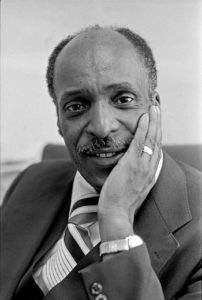
Nathaniel R. Jones
*Nathaniel R. Jones was born on this date in 1926. He was a Black attorney, judge, and law professor.
Nathaniel Raphael Jones was born in the Smoky Hollow district of Youngstown, Ohio, several blocks from a federal courthouse that now bears his name. Although he lived in an integrated neighborhood and attended an integrated public high school, his mother took him to the local segregated YMCA. There, he heard and met national civil rights leaders. She also introduced him to J. Maynard Dickerson, a lawyer and publisher of the weekly black newspaper The Buckeye Review, who became his mentor.
Jones became active in the NAACP's youth council and successfully organized a boycott of the local roller-skating rink, which previously allowed Blacks to skate only on Monday nights. He graduated from high school in 1945 and was drafted into the U.S. Army as World War II had not ended. He later recalled his disbelief at the segregated training facility at Camp Atterbury, Indiana; those Italian prisoners of war received better treatment than black soldiers. Nonetheless, Jones served with the United States Army Air Corps. After the war, Jones entered Youngstown College (now Youngstown State University) using the GI Bill. There, he continued working with the NAACP, and when nearby Warren, Ohio, tried to bar Blacks from the local swimming pool, he saw future Supreme Court justice Thurgood Marshall in action.
After receiving his Artium Baccalaureus degree in 1951, he enrolled in law school, studying nights while serving as director of Youngstown's Fair Employment Practices Commission. He graduated in 1956, receiving a Bachelor of Laws degree. Jones was admitted to the bar in 1957, setting up his private practice. In 1961, Attorney General Robert Kennedy nominated him as Assistant United States Attorney for the Northern District of Ohio in Cleveland. He was becoming the first Black to serve in that position in the district. He held that position until his 1967 appointment as Assistant General Counsel to President Lyndon B. Johnson's National Advisory Commission on Civil Disorders (the Kerner Commission). Following his term with the Kerner Commission, Jones returned to private practice with the firm of Goldberg & Jones in Youngstown.
In 1969, he served as general counsel of the NAACP. Jones was honored by over 600 dignitaries at an NAACP recognition banquet in Youngstown the following year. In a keynote address, he described the situation of Blacks in the following terms: "We still live in the basement of the great society. We must keep plodding until we get what we are striving for". For the next nine years, Jones directed all NAACP litigation. In addition to personally arguing several cases in the United States Supreme Court, he coordinated national efforts to end northern school segregation, defend affirmative action, and inquire into discrimination against black service members in the United States military. In the Mississippi Boycott case, he successfully coordinated the NAACP's defense on First Amendment grounds and won Reed v. Rhodes, desegregating Cleveland-area schools.
However, he was also the losing attorney in Milliken v. Bradley, restricting urban/suburban desegregation efforts. On August 28, 1979, President Jimmy Carter nominated Jones to a seat on the United States Court of Appeals for the Sixth Circuit, vacated by Judge John Weld Peck II. The United States Senate confirmed his nomination on October 4, 1979, and he received his commission the next day. He took his judicial oath on October 15, 1979. He assumed senior status on May 13, 1995, and retired on March 30, 2002. While on the federal bench and hearing cases, Judge Jones taught at Harvard Law School and the University of Cincinnati College of Law. He also made many trips to South Africa. He spoke against the legal underpinnings of apartheid, became one of the observers for the first democratic elections in 1993, and later consulted with drafters of the South African constitution.
After his retirement, Jones became a Senior Counsel in the Cincinnati office of Blank Rome LLP, serving as its Chief Diversity and Inclusion Officer. He also wrote a memoir, "Answering the Call: An Autobiography of the Modern Struggle to End Racial Discrimination in America" (2016), with a foreword by Harvard professor Evelyn Brooks Higginbotham. On May 6, 2003, the second federal courthouse established in Youngstown, Ohio, was named in honor of Jones. Former U.S. Representative Louis B. Stokes of Cleveland was responsible for the naming ceremony.
"This building, which will forever carry your name, will be a testament to outstanding public service by a local boy made good," Stokes said. Jones received the NAACP's Spingarn Medal in 2016. The University of Cincinnati named its Center for Race, Gender, and Social Justice to honor Judge Jones in 2019. He also received 19 honorary degrees. Jones was married to the late Lillian Graham Jones (née Hawthorne) and had five children: Stephanie J. Jones, William L. Hawthorne, Ricky B. Hawthorne, Marc D. Hawthorne, and Pamela L. Velez. Jones was a Prince Hall Freemason and a Kappa Alpha Psi fraternity member. Jones died on January 26, 2020, at 93, from congestive heart failure.